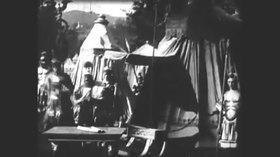Spartacus (1913)
| Movie | |
|---|---|
| German title | Spartacus |
| Original title | Spartaco / Spartaco, il gladiatore della Tracia |
| Country of production | Italy |
| original language | Italian |
| Publishing year | 1913 |
| length | 88 minutes |
| Rod | |
| Director | Giovanni Enrico Vidali |
| script | Renzo Chiosso or Raffaello Giovagnoli based on his own novel |
| production | Ernesto Maria Pasquali for Pasquali e Co., Milan |
| music | Modest Altschuler |
| occupation | |
| |
Spartacus is a silent , Italian history and sandal film from 1913.
action
In ancient Rome at the time of the consuls Pompey and Crassus. In eastern Greece, the young Thracian Spartacus is deported to Rome as a slave. His owner Crassus quickly asks the powerful young man to stand as a gladiator in the lion arena. Life as a Roman slave under his new master, Consul Crassus, is extremely hard and unfair, even if his love for the daughter of Crassus allows him to have good moments. When the pleasure-addicted Crassus demands an absurdity in an orgy - namely, a duel for life and death with Amoricus, the fiancé of sister Spartacus - the unconditional will to resist and revolt against slavery breaks out in Spartacus. With the help of other gladiators and slaves, Spartacus dares the great liberation, wrestles the Romans in a surprise coup and flees Rome.
Finally in freedom, the proud Thracian begins to build his own army with which he wants to fight the vastly superior Roman troops. When the Senate learns of the shocking news of an army of slaves turning against Rome, resolutions are hastily taken to counter this in order to nip this rebellion in the bud. Meanwhile, Spartacus has fallen in love with a compatriot, a young Thracian. The first military clash between Spartacus rebels and the Roman armies takes place in Apulia, near the ancient city of Petilia. Spartacus emerges victorious in the fight against the troops of his former owner Crassus, but in the subsequent battle in Lucania the Spartacus loyalists are completely wiped out. Spartacus himself falls victim to a devious intrigue and dies a cruel martyr's death.
Production notes
Spartacus is considered to be the first film adaptation of this well-known material about the leader of the slave revolt against the Roman oppressors around seven decades before the birth of Christ. The film found its first screenings in Italy and Spain in 1913. On February 13, 1914, Spartacus could be seen for the first time in Austria-Hungary (Vienna), and in May 1914 the German premiere took place in the Cines on Nollendorfplatz in Berlin. In Germany, the eight-stroke was around 120 minutes long. Spartacus was already shown in British and French cinemas in January of the same year .
The later sensational film and sandal film star Luciano Albertini allegedly made his film debut here.
Reviews
“The marvelous mass displays in the circus games, the gladiatorial parades, the battles of the two-sided army masses astonished and inspired, the individual representation deserves all praise”.
Vienna's Neue Freie Presse reported: "The proud buildings of ancient Rome and the magnificent mountain landscape of the Apennines form the framework for this spectacle, which tens of thousands of participants give life and effect."
Web links
- Spartacus in the Internet Movie Database (English)
- Spartacus at The German Early Cinema Database
Individual evidence
- ↑ Cinematographische Rundschau of February 15, 1914, p. 96
- ↑ "Spartacus". In: Neue Freie Presse , February 22, 1914, p. 26 (online at ANNO ).
